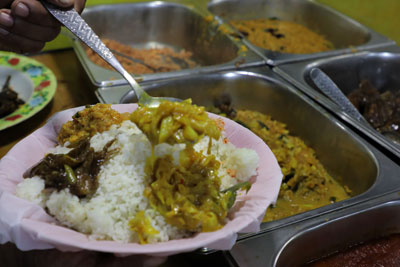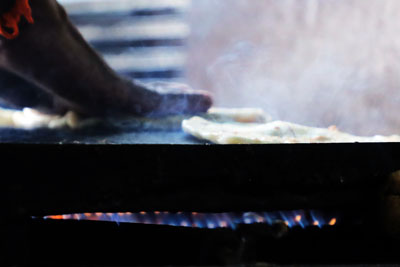News
Takeaways and eating out pick up as home cooking fizzles out

The demand for lunch time meals has increased for this wayside eating place
Preparing dishes in rice cookers or curries in microwave cookers have become family favourites among some Sri Lankans who can afford to turn to electric appliances
Electric and kerosene cookers and wood stoves are fast replacing gas cookers, due to gas shortages while some depend on takeaways or eating out.
Restaurants in the meantime though grateful for the increased business after a long lockdown, also face the challenge of sourcing gas to cater to their customers.
“We’re firefighting in a boxing ring,” said restaurateur Harpo Gooneratne. Access to gas has boiled down to the relationship that restaurant owners have with their suppliers and how much they’re willing to pay, he said.
Mr. Gooneratne said maneuvering through shortages and soaring prices of ingredients was becoming increasingly difficult since maintaining standards and keeping competitive pricing were vital to a restaurant’s sustenance. “We have become stuck in this vicious cycle because we have to be reasonable to our customers and make sure we don’t outprice our products,” he said.
He said many business owners are weathering the storm by exercising resource control through careful planning. The reopening of the industry after the extended lockdowns cost business owners significantly in terms of investments into refurbishments. “So we must keep battering on with control, control, and control, and keep looking for the silver lining.”

A wayside boutique preparing roti on a low flame to economise on the use of gas. Pix by M.A. Pushpa Kumara
Another cloud kitchen owner told the Sunday Times that some were selling LP gas ridiculously high prices.
“I’ve seen shops selling a cylinder of gas between Rs. 2900 and Rs. 3800,” he said.
His restaurant, usually gets the bigger cylinders of 37.5 kg and this generally lasts 5-7 days when business is good. “But since sales are not what it used to be, now it lasts for about two weeks.” Apart from this he said the restaurant market was also saturated because of delivery apps such as Pickme Food and Ubereats which make competitive pricing even more vital.
However, Twitter users told the Sunday Times this week that eating out was also very expensive. “Even buffets that used to be about Rs. 3000 per person now cost about Rs. 7500, and this pattern is seen even in the less expensive food too,” one noted.
Smaller street food shops are the most hard-hit because they cannot afford to pay high prices or buy gas cylinders in excess. One Saiwer Kade owner from Gothatuwa said they cook curries in the rice cooker to preserve the gas they have. They cope with lunch-hour business rush by strating to prepare curries much earlier than they used to, curry at a time in the rice cooker.
Another street food vendor running a kottu and hoppers shop on W. A. D. Ramanayake Mw said they were experiencing a higher demand for lunch and dinner from the offices in the vicinity. “This is good in a way because then we earn significantly more with the gas we use,” he said, adding however that faster depleting resources mean that they cannot take advantage of the high demand for long.
The best way to say that you found the home of your dreams is by finding it on Hitad.lk. We have listings for apartments for sale or rent in Sri Lanka, no matter what locale you're looking for! Whether you live in Colombo, Galle, Kandy, Matara, Jaffna and more - we've got them all!

